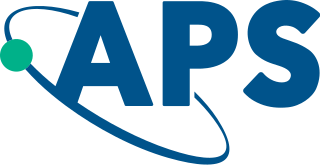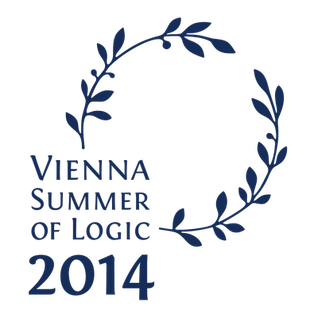The Association for Computing Machinery (ACM) is a US-based international learned society for computing. It was founded in 1947 and is the world's largest scientific and educational computing society. The ACM is a non-profit professional membership group, reporting nearly 110,000 student and professional members as of 2022. Its headquarters are in New York City.

The American Physical Society (APS) is a not-for-profit membership organization of professionals in physics and related disciplines, comprising nearly fifty divisions, sections, and other units. Its mission is the advancement and diffusion of knowledge of physics. The society publishes more than a dozen scientific journals, including the prestigious Physical Review and Physical Review Letters, and organizes more than twenty science meetings each year. APS is a member society of the American Institute of Physics. Since January 2021 the organization has been led by chief executive officer Jonathan Bagger.

Dagstuhl is a computer science research center in Germany, located in and named after a district of the town of Wadern, Merzig-Wadern, Saarland.
The Computing Research Association (CRA) is a 501(c)3 non-profit association of North American academic departments of computer science, computer engineering, and related fields; laboratories and centers in industry, government, and academia engaging in basic computing research; and affiliated professional societies. CRA was formed in 1972 and is based in Washington, D.C., United States.
In computational complexity theory, a nonelementary problem is a problem that is not a member of the class ELEMENTARY. As a class it is sometimes denoted as NONELEMENTARY.

Egon Börger is a German-born computer scientist based in Italy.

The American Society for Engineering Education (ASEE) is a non-profit member association, founded in 1893, dedicated to promoting and improving engineering and engineering technology education. The purpose of ASEE is the advancement of education in all of its functions which pertain to engineering and allied branches of science and technology, including the processes of teaching and learning, counseling, research, extension services and public relations. ASEE administers the engineering technology honor society Tau Alpha Pi.

The Mexican Academy of Sciences(Academia Mexicana de Ciencias) is a non-profit organization comprising over 1800 distinguished Mexican scientists, attached to various institutions in the country, as well as a number of eminent foreign colleagues, including various Nobel Prize winners. The organization, which encompasses exact and natural sciences as well as the social sciences and humanities, is founded on the belief that education, based on the truth of scientific knowledge, is the only means, in the short and long term, of achieving the development of the Mexican spirit and national sovereignty.
SIGKDD, representing the Association for Computing Machinery's (ACM) Special Interest Group (SIG) on Knowledge Discovery and Data Mining, hosts an influential annual conference.

Moshe Ya'akov Vardi is an Israeli mathematician and computer scientist. He is the Karen Ostrum George Distinguished Service Professor in Computational Engineering at Rice University, United States. and a faculty advisor for the Ken Kennedy Institute. His interests focus on applications of logic to computer science, including database theory, finite model theory, knowledge of multi-agent systems, computer-aided verification and reasoning, and teaching logic across the curriculum. He is an expert in model checking, constraint satisfaction and database theory, common knowledge (logic), and theoretical computer science.
CIAA, the International Conference on Implementation and Application of Automata is an annual academic conference in the field of computer science. Its purpose is to bring together members of the academic, research, and industrial community who have an interest in the theory, implementation, and application of automata and related structures. There, the conference concerns research on all aspects of implementation and application of automata and related structures, including theoretical aspects. In 2000, the conference grew out of the Workshop on Implementation of Automata (WIA).
The European Symposium on Algorithms (ESA) is an international conference covering the field of algorithms. It has been held annually since 1993, typically in early Autumn in a different European location each year. Like most theoretical computer science conferences its contributions are strongly peer-reviewed; the articles appear in proceedings published in Springer Lecture Notes in Computer Science. Acceptance rate of ESA is 24% in 2012 in both Design and Analysis and Engineering and Applications tracks.

The Association Computability in Europe (ACiE) is an international organization of mathematicians, logicians, computer scientists, philosophers, theoretical physicists and others interested in new developments in computability and in their underlying significance for the real world. CiE aims to widen understanding and appreciation of the importance of the concepts and techniques of computability theory, and to support the development of a vibrant multi-disciplinary community of researchers focused on computability-related topics. The ACiE positions itself at the interface between applied and fundamental research, prioritising mathematical approaches to computational barriers.

The Institute of Mathematics and Applications (IMA), located in Bhubaneswar, Odisha, in India, is a research and education institution that was established by the Government of Odisha in 1999. Its dual purposes are to conduct advanced research in pure and applied mathematics and to provide postgraduate education leading to master's and Ph.D. degrees in mathematics, computation, computational finance, and data science. The institute also runs training programs in schools aimed at increasing mathematics awareness and leading to competitions such as the Mathematics Olympiads. The UG and PG courses are currently affiliated to Utkal University, which is the largest affiliating university in the country.
The International Society for Pediatric and Adolescent Diabetes is a professional organization located in Berlin, Germany, whose aims are to promote clinical basic science, research, education and advocacy in childhood and adolescent diabetes. ISPAD publishes the journal Pediatric Diabetes. The organization was established in 1974.

The Government College of Engineering Karunagappally (CEK) is a public institute of engineering and technology in Karunagappally, in the north-west of Kollam district, Kerala, India. Established in 1999 by the Government of Kerala, it is the second engineering college in Kollam district the fourth engineering college under the aegis of the state government's Institute of Human Resources Development in Electronics. The institute is affiliated to the A P J Abdul Kalam Technological University, Recognized by AICTE and Accredited by National Board of Accreditation(NBA). It is the second engineering College in the Kerala Section to win the prestigious IEEE Region 10(Asia - Pacific) Exemplary Student Branch Award, Only student branch in Asia Pacific Region to win the IEEE MGA Regional Exemplary Student Branch Award twice in a row.

The International Conference on Computational Intelligence Methods for Bioinformatics and Biostatistics (CIBB) is a yearly scientific conference focused on machine learning and computational intelligence applied to bioinformatics and biostatistics.

The Vienna Summer of Logic was a scientific event in the summer of 2014, combining 12 major conferences and several workshops from the fields of mathematical logic, logic in computer science, and logic in artificial intelligence. The meetings took place from July 9 to 24, 2014, and attracted more than 2000 scientists and researchers.
ACM SIGLOG or SIGLOG is the Association for Computing Machinery Special Interest Group on Logic and Computation. It publishes a news magazine, and has the annual ACM-IEEE Symposium on Logic in Computer Science (LICS) as its flagship conference. In addition, it publishes an online newsletter, the SIGLOG Monthly Bulletin, and "maintains close ties" with the related academic journal ACM Transactions on Computational Logic.










